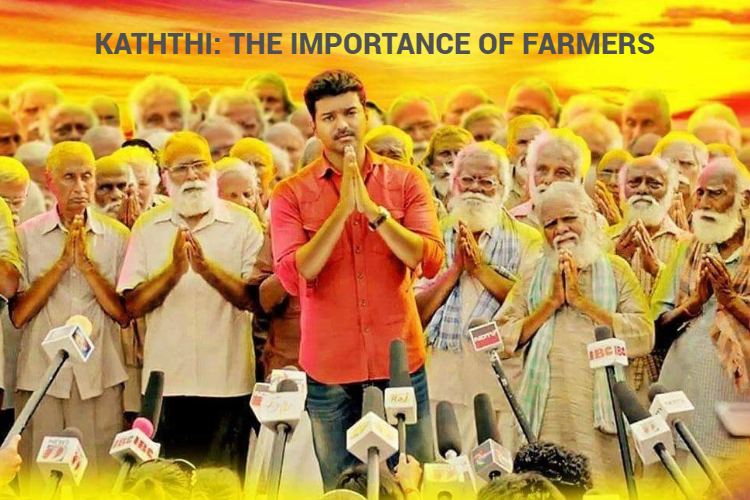
KATHTHI: THE IMPORTANCE OF FARMERS
In Kaththi, a case of impersonation brings Kathiresan into a fight against a large corporation trying to take over a village’s land.
In the film Kaththi (2014) Jeevanandhan, is a social activist that is fighting against a multinational corporation owned by an influential entrepreneur to restore farming in his village. Kathiresan, a petty thief who escapes from prison, accidentally encounters his lookalike, Jeevanandhan, who gets shot by thugs. To save himself Kathiresan takes Jeevanandhan’s identity which turns him into a crusader.
ABOUT KATHTHI
Kaththi stars Thalapathy Vijay playing a dual role alongside Samantha, Neil Nitin Mukesh, Tota Roy Chowdhury, and Sathish. It’s written and directed by AR Murugadoss and produced by Lyca Productions.
The Tamil-Language action/social drama musical was also released in Telegu-language in 2014 and in 2017 it was released in Hindi titled Khaki Aur Khiladi. The film had many problems from plagiarism allegations and lawsuits but despite all that, it managed to be successful financially and in popularity. In 2017, the film was remade into the Telugu language film titled Khaidi No. 150.

WHERE TO WATCH
It is logical to make the story for the general audience if you want more people to see the film and not make it only for a niche section which is what many would prefer these kinds of projects to be. The support of a small audience has less impact than the masses. The film can be watched on Amazon Prime with English subtitles and on Eros Now (without subtitles). The Hindi version can be watched on YouTube on the Pen Movies official channel.
THE STORY
In the next section, I will share with you how I understood the film with subtitles. Yes, there are going to be major spoilers but I think it’s important to share this perspective because sometimes things can get lost in translation or cultural differences may have an impact on how one interprets the story. I think it’s unfair when this happens with critics that are very quick to judge. Especially with foreign cinema, audiences tend to rely on critics and influencers that sometimes have their own biases or even have no idea about what they are reviewing.
Eventually, I think it’s better to watch it and make your own assessment. Sometimes rewatching is necessary. Afterward, it’s fun to compare with these “critics and influencers” and see how much they got wrong. There is always something. Now, let’s get into the story…
PRISON BREAK
The story starts with a prison break in Kolkata, India. It first appeared that prisoner Kathiresan, played by Thalapathy Vijay, was escaping but he was actually helping the police capture the escaping prisoner Vivek Banerjee, played by Tota Roy Chowdhury, but he eventually escapes afterward. Kathiresan goes to Chennai to then escape to Bangkok with his friend Ravi, played by Sathish. After meeting Ankitha, played by Samantha, at the airport, he changes plans. Ankitha makes him believe that she wants to marry him and gives him a false phone number.
One night Kathiresan and Ravi see Jeevanandham’s truck crash and him being shot by a group of thugs. They notice how much he resembles Kathiresan. They took him to a hospital, and Kathiresan (Kathir) decides to impersonate the injured Jeevanandham (Jeeva) to escape from the police.
MEETING THE ELDERS
Kathir impersonates Jeeva and his friend Ravi enter a retirement home run by Jeeva with the intention of stealing money for their Bangkok trip. One night one of the elders gets sick and the electricity goes out. He is trying to pacify the elderly and asks whether a family member is coming. Someone says in the dark that someone arrived. He slaps that person who turns out to be Ankita and realizes he still likes her. She stayed the night taking care of her relative.
At the hospital, one of the police officers acknowledges that Jeeva is not Kathir, but they still intend to take him to prison. In the meantime, Kathir is visited by two English female Journalists who turned to be henchwomen with the intention to kill him. He then is kidnapped by the greedy entrepreneur Chirag played by Neil Nitin Mukesh, that promises to kill the elderly if he doesn’t cooperate and offers him 2.5 million, with an advance in cash which he accepts.
Later on, he receives a call from one of the elders asking him to come to an event where he will be awarded. There he learns about Jeeva’s mission, he decides not to take the money. Jeeva is a post-graduate in hydrology from the arid village of Thanoothu in Tirunelveli district who naively believes in the communist ideology. Groundwater was discovered under some lands of the village which could be used as an irrigation source not only for the village but for the entire Tirunelveli district and the neighboring Thoothukudi district.
However, Chirag deceived the villagers into giving their lands for the construction of his factory. During the protests, Jeeva got arrested and the villagers didn’t know what to do. Six villagers committed suicide in front of a reporter to bring this news to the media forefront and get Jeeva released. The men from the village had to look for work outside the village leaving their families behind. They all are waiting for Jeeva to win the case and come back home. All this was shown at the award show. Kathir was visibly shaken when receiving the award.
JOINING THE CAUSE
Moved by Jeeva’s past, Kathir decides to return the money. When he decides to leave Ravi tells him that the elders are being beaten by Chirag henchmen. Kathir goes to the retirement home and beats the henchmen one by one. Kathir then decided to stay and join the villagers’ cause. Chirag calls him and warns him that he will take the village and make it his factory workers’ toilet. A few days later Kathir and Ankita are looking on the internet for information on similar cases, she later declares her love for Jeeva which Kathir reciprocates.
The elders from the retirement home and Kathir go to the jury and try to convince him to go in favor of them, but as Kathir starts stating rules this scares the main jury person, Mr. Lakshmi, who was bribed by Chirag. He directly goes and informs Chirag. Kathir then sends a person disguised as a hairdresser to Chirag and makes him lay a fingerprint on Chirag’s neck.
Kathir calls Mr. Lakshmi and requests him to put him on speaker. Chirag is baffled by Jeeva’s behavior and sends his henchmen to kill Kathir, but he defeats them one by one with Kavi’s help using his coin method. Meanwhile, Jeeva finds himself in the Kolkata prison. Vivek recognizes that he is a different person, and he tells him his story. Vivek helps him escape but secretly plans to kill Kathir.
A few days later, at the Madras High Court, the judge declares the verdict in favor of Jeeva and the villagers but adds that Chirag has claimed that certain villagers working abroad have shown their support for the factory construction project. If they cannot prove that their support was faked by Chirag within the next five days, the verdict will go in Chirag’s favor.
Coincidentally, the villagers who have denied supporting the factory construction project are abroad and are not able to come to Chennai so soon to rebut Chirag’s claims as their passports are held by their contractors. Kathir tries to locate them, but he is not able to get them to India. Chirag then calls him and insinuates that he manages to send every young male villager abroad. “My corporate company is very big and your village is like a mosquito stuck on the spider web”, he says.
THE PROTEST
Unaware that Jeeva is headed for Chennai with Vivek’s henchmen, Kathir tries to convince the media to report on the plight of the villagers, but the media is uninterested as they feel it is not sensational news.
Kathir then decides to take drastic measures to sensationalize the issue. He, Ankitha, Ravi, and the elders from the retirement home blocked the water supply to Chennai by sitting on the pipelines which carry water to Chennai from five lakes. All this was filmed on a CD that the pipeline workers found next to the pipes. The local police came to take them out, but they refused stating that they would burn the pipelines if they are forced to come out. Ankitha who sits in another pipeline than Kathir calls him to ask for her grandpa to give him an engagement ring. Meanwhile, all protesters are following the news on the radio.
One day without water created chaos in the urban areas and gained national media attention. Some villages that are used to not receiving clean water for a long period of time support the protest. People in the city think it’s unfair to compare a city with a village. Kathir comes out of the pipeline after a few days and highlights the villagers’ plight to the media to change the city’s people’s views.
By now, Kathir knows that Jeeva escaped and is searching for him. Meanwhile, Jeeva and Vivek’s henchmen reach Chennai, but Jeeva is kidnapped by Chirag’s henchmen. While in Chirag’s custody, he sees Kathir’s speech on television and is moved by his efforts to help the villagers. Chirag is stunned, unable to believe what he is seeing. His impactful speech is telecast nationwide. A speech that was delivered with emotion and conviction.

He starts questioning the first reporter who inquired why he is using these old folks and whether he ever plants a tree. The reporter tells jokingly that he has a money plant in his backyard. Kather then tells them:
“These old folks did not plant money plants but plants that make all of you live today. 200 villages were destroyed by the American Developers. This is the only village that has gone against them. They have lost lives because of this.” We have tried our best to let everyone know but we were not able to. Have you thought of the farmers each time you eat rice? 7000 farming lands and water supplies are being destroyed over the years. Where will the farmers go for water if the Cola company is taking 9000 liters of water per day? They are not begging for food but asking for water to do agriculture. Not only these farmers but all the others that ran away as well.
Farmers who were farming 20 years ago are having a bad life now. Every 30 minutes one farmer is committing suicide in India. This has been happening for the past 10 years. They live to give everyone food but now there is less. Over 100,000 farmers are working other jobs to survive. Now the multinational company is trying to destroy the balanced land which can be used for farming. All the families are going to die without food.
A beer factory owner couldn’t pay the debt of 500 million but did not commit suicide. But a farmer who just can’t pay his debt of 500 commits suicide. You people in the city don’t have time for all this. Am I right? We wanted to tell this to the TV channels and asked for a chance. They said they don’t have time for all this since it is not an interesting topic. We are not saying we don’t want factories but not factories that use all our resources for their benefit. 5000 babies die in a day in India due to a lack of vitamins. If strawberry flavor soap is needed by the rich, a poor kid can never imagine eating it.
A reporter then asks “Are you trying to say that water is so expensive?” Just water? Kathir asks. 2G is just air and has been sold here for millions, then how about water? No water. No life. We decided to do this to help our village.
We truly apologize to all ladies and children who suffered without water for the past 3 days. In 40 minutes, you will get water but for the village, it depends on the decision given in the court later. I hope the cops won’t follow us now because it will delay the water supply again. We will surrender tomorrow in court for doing this.”

THE VERDICT
Kathir’s true identity is exposed on the night before the verdict, but he promises to help the villagers. He tells them that Jeeva is alive, that he will rescue him from Chirag and hand him back to the villagers with the assurance of a positive verdict. Kathir goes to Chirag’s office, rescues Jeeva, and kills Chirag.
On the next day, the verdict is declared in favor of Jeeva and the villagers. Kathir remains at a distance and does not take part in the ensuing celebrations. Kathir and Jeeva talk on the phone. Kathir tells him that he is still a jailbird and that it is not right for him to be there. He talks to Ankita and she tells him that he is a good man and that she will wait for him. Jeeva shows Kathir his family from a distance. And the elders who noticed him thanked him. Kathir leaves the place and surrenders to the police and returns to the Kolkata prison after promising Ankitha, who has now fallen in love with him, that he will marry her once he is released.
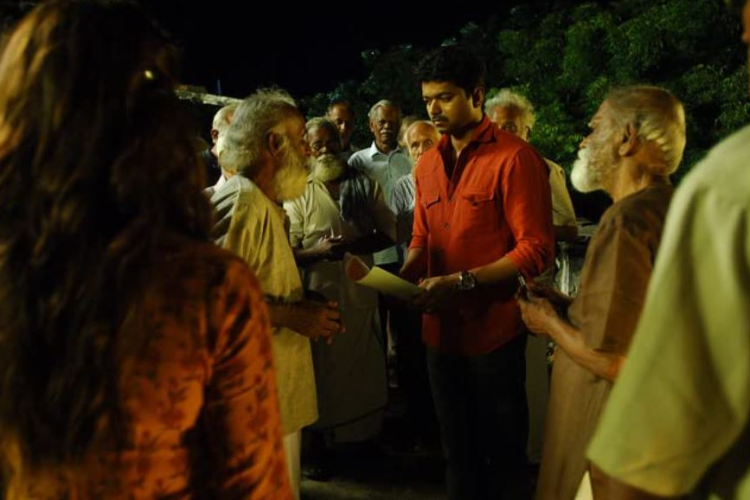
THE THEMES
Kaththi deals with the issues farmers face on a daily basis and the suicide of farmers due to corporate encroachment, and the violation of their property rights. The film also deals with several themes such as corruption, water scarcity, the insensitive mainstream media, corporate greed & naivety, communism & naivety, and the will to retire.
The film does a good job of showcasing the issues in many ways. Kaththi starts with the opening credits. Though the symbolism used is subtle, it’s powerful to those that recognize it. We see silhouettes of machines, which displaces the poorer sections of the population from their basic needs, in outlines of birds, cows, and women who represent the living and humane. Industrialization and what it does to the poor is another issue that is featured in Kaththi.
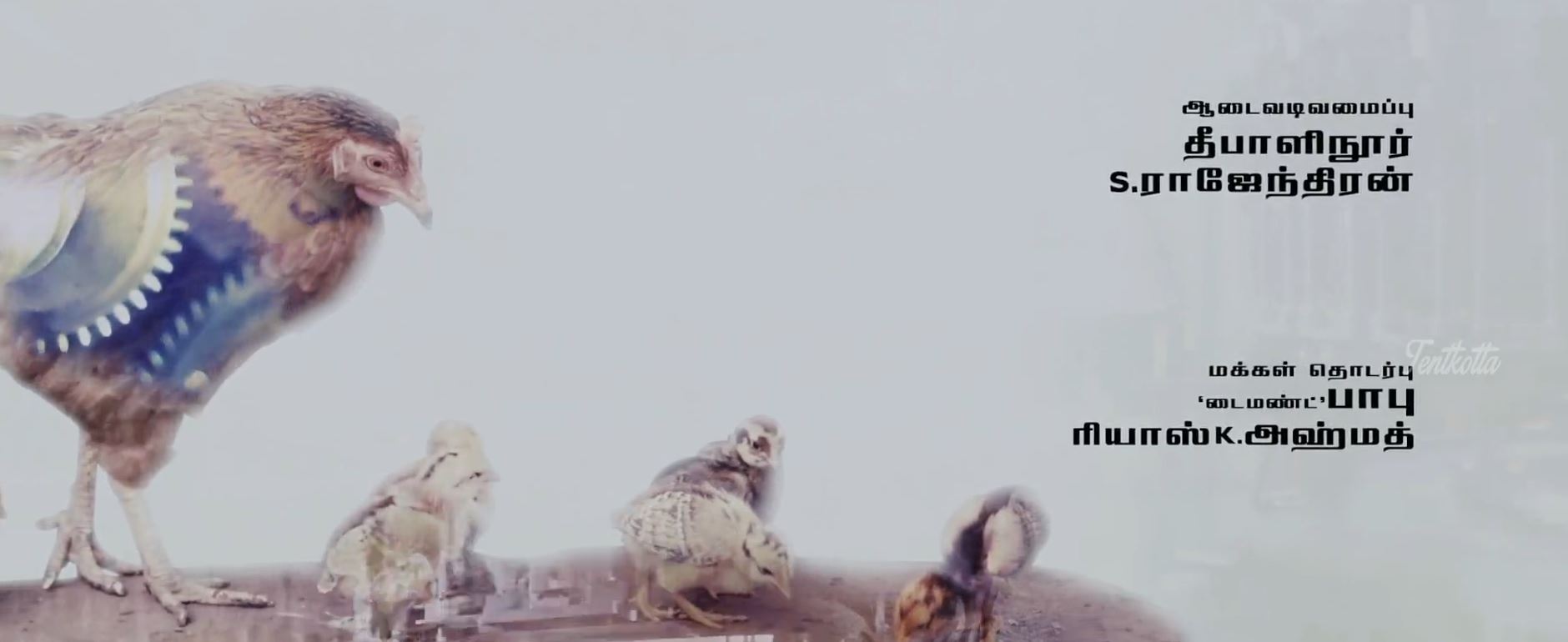
CORRUPTION
Corruption is the cause of all societal issues. Kaththi has scenes that showcase the corruption that has grown in the government and the judiciary system. It very much represents the current state of the government and judiciary system of many countries.
WATER SCARCITY
Water Scarcity is an important theme in Kaththi. The impact of water scarcity, which most people take for granted, is showcased in the scenes where the people living in urban areas go crazy without water for 3 days, while there are villages that did not have clean water for years.
THE INSENCITIVE MEDIA
Every news story has a value. The basic needs of people don’t find much value to be given slots in TV Channels and coverage in dailies. When farmers’ state isn’t worthy enough to give them attention, they are forced to adopt the one way left for them to get attention, Mass Suicide. The insensitive media is another issue that Kaththi successfully showcases.
CORPORATE GREED AND NAIVETY
Corporate greed and naivety- the ill-effects of capitalism. Poor villages become victims of the Corporate Web because they don’t have the education nor the experience in dealing with opportunists that use capitalism and industrialization to exploit them.
COMMUNISM AND NAIVETY
Communism and naivety. Jeeva explains his view of communism using idli: “The other idli we eat when our stomachs are full is someone else’s”. Jeeva’s fight is for this ideology, which is lost along with the impoverished. The lack of awareness of this ‘for all’ principle and what it all entails is another theme the film covers.
Jeeva’s naivety, when surrounded by foxes, only delayed justice. Justice was served only after someone who can act like a fox came into the picture. The film illustrates how being naive isn’t acceptable when dealing with government entities and businesses.
RETIREMENT BY CHOICE
Retirement isn’t based on your Date of Birth but on your will. When people like Mother Teresa and Mahatma Gandhi fought for the needs of people when they were post-retirement age, why can’t the recently retired stand up for their needs? Why do they give up so easily? The film makes you think about this.
With this particular issue, I felt conflicted. Why should the elderly fight at their age when they should be enjoying a well-deserved long vacation and living a peaceful life after decades of hard work? I know that there are countries where employers are not obligated to provide pensions and by then the elderly still need to provide for their family so instead of retiring, they choose to continue to work.
But in countries where people save for a retirement fund or pay taxes to provide a retirement fund to elders why can’t they choose to retire when they want? Especially those that perform physical work. And isn’t forcing people to retire at a certain older age also problematic in these cases? This is one of those issues that we don’t talk about enough, instead, we are busy with the daily social media distractions.
THE IMPACT OF KATHTHI
THE INSPIRATION
Kaththi became so iconic that it inspired other filmmakers to make more films in upcoming years on agriculture and problems faced by farmers and some scenes inspired actors to take on these kinds of roles. However, this movement was also criticized by some critics/editors as taking advantage of the popularity of the farmers’ protests which is a fair criticism, I think.
The fact that it is popular will surely attract money grabbers, but the subject has remained important to this day and if it inspires others to tell more stories let them do it. If the performances are authentic, the message will resonate with the audience. There is even a reference to the film Eega in the film which I thought was funny. Samantha is the same actress that played the love interest in Eega. I also liked the fight scene with the English women, nobody was holding back but Kathir managed to defeat them.
It’s not surprising that the farmers’ struggles continue to this day. Corruption and third-party influences in any process are very difficult to fight but showcasing them to the world creates a dent in their power.
FARMERS OF THE WORLD
The world now not only knows about the farmers from India, but in recent years farmers in Argentina, Peru, the Netherlands, France, and many others made some noise. The mainstream media tried to silence that noise, but the world was able to follow some of it through independent media.
When so much attention is given to these themes with a positive impact on society, at least raising awareness on the issues should be considered a win, there is going to be a big influence from those benefiting from the status quo to prevent these types of movies being made, especially when names of influential big corporations are being dropped in the film.
KATHTHI VS KHAIDI NO. 150
Khaidi No. 150 was produced by the same company that produced Kaththi alongside the Konidela Production Company. The film was directed by V.V. Vinayak starring Chiranjeevi and Kajal Aggarwal in the lead roles.
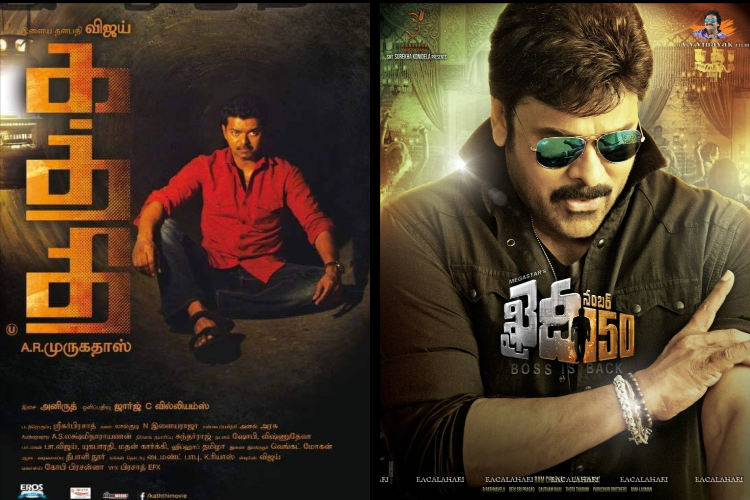
Khaidi No. 150 (2017) has a similar story to Kaththi (2014) with some significant changes that in my opinion diminish the impact of the original story. This is where the criticism of taking these stories just because they are popular to make cash is valid.
This is an example where changes in the story and underwhelming performances diminish the impact of the original story such as the arrest of Jeeva. In Kaththi it showcased the reality of the corruption in the government and the police.
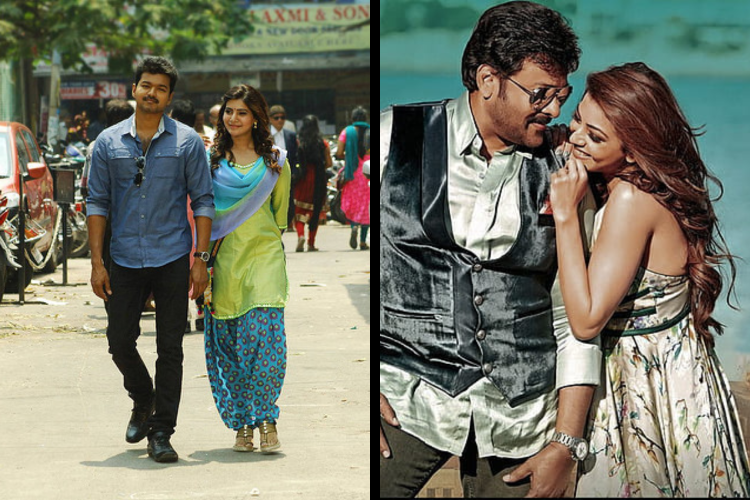
The Protagonist in Khaidi No. 150 is not as impactful as Kaththi, especially with the delivery of the speech. The love interest in Khaidi No. 150 has more character and personality which is an improvement to Ankita in Kaththi that just came off as a pretty face. I’ve seen some of Samantha’s movies (like Majili and Oh!Baby) and feel like she could have given a better performance. Sometimes its the direction chosen that limits the acting, I don’t really know.
The ideal scenario would be making a movie with the protagonist in Kaththi and the love interest from Khaidi No. 150. The villain in Kaththi is good. You hate him as soon as he enters the scene. He is despicable and sometimes annoying throughout the whole movie. The villain in Khaidi No. 150 is underwhelming in comparison. Kathir’s friend’s character in Khaidi No. 150 was changed into comedic relief. And the Eega reference from Kaththi was removed obviously because the love interest is played by another actress.
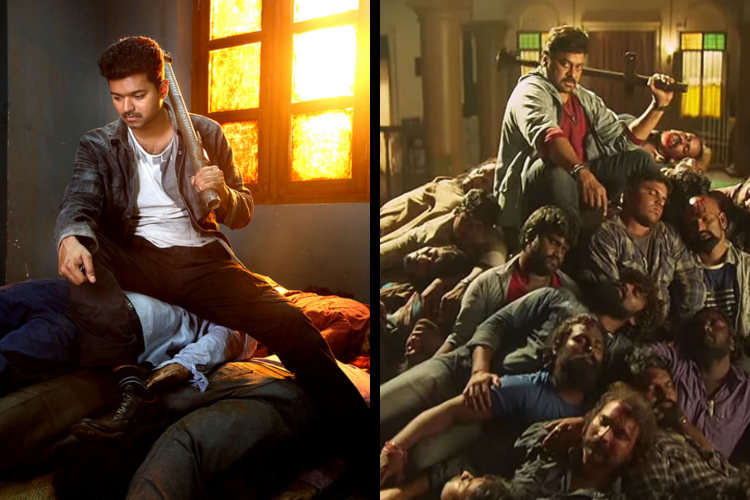
And to finalize the ending of Khaidi No. 150 was also changed into a traditional/cliche happy ending. In Kaththi, Kathir felt that he wasn’t entitled to join the celebration because it was not his body of work that made it successful, but he just helped during the finals. He also felt that he needed to turn himself in and complete his prison sentence, which is the right thing to do. You see that he went through a transformation during his time impersonating Jeeva and is in the process of reforming to join society again.
In Khaidi No. 150 Kathir joins the celebrations, gets pardoned, and stays with his love interest. You don’t see a culmination of his transformation which gave me the impression that he could fall again into his bad habits.
My Rating for Kaththi: 8/10
My Rating for Khaidi No. 150: 6.5/10
PORTRAYING REAL ACTIVISTS
This is a story where people are actually fighting in their own way to bring positive change to their lives and their communities. It is the real social activism, not the fake social justice we see in the West that is fighting for trivial things in comparison. Their lives are going so well that they need to invent problems they don’t really have.
It’s heartbreaking to see people caring so much about the climate when there are people starving to death, fighting to survive another day without clean water, dying in wars, and working as slaves.
FOCUS ON PEOPLE
We would be in a better place if the focus is placed on human life, fighting poverty, investing in education, and preventing human trafficking. People are so obsessed with the climate that they are not able to see how their solutions are destroying nature. In some cases, you can’t even challenge it because it’s the best. We are not able to discuss the future ramifications that these solutions will bring and that we and future generations will eventually face.
Kaththi is a 2014 Indian Tamil language film that starts as an action comedy but slowly turns into a very serious social drama. Kaththi showcases the farmer’s struggles in India, but it reflects the farmers’ struggles worldwide. The conditions may be different but farmers all over the world are fighting for their rights.
NO FARMERS NO FOOD
No farmers No healthy Food. Healthy food is popular these days and the media and certain groups are trying to sell lab food as healthy. If it has chemicals in it is not healthy and yes preservatives to make it last longer are chemicals.
It is better to buy vegetables, fruits, meat, and fish directly from the source (the farmers’ market, the butcher, the fish market). Why? Unfortunately, in larger stores, you will find food that looks good, but you don’t know the level of pesticides, herbicides, and fertilizers that were used on them to make them look that good.
Now what would happen if we had no farmers? Remember how the Canadian truckers “Freedom Convoy” reminded the world about the importance of transportation of food and other necessities? With no truckers, there are no goods to buy. If they are so important, why do they struggle so much to have decent conditions to work in? Remember how they were treated? These are questions we should discuss and talk about more.
NO WATER NO LIFE
The film showcases the extremes that farmers need to go to just to maintain ownership of their water. The scarcity of clean water is not only a village problem but even in wealthy countries such as the U.S. places such as Flint, Michigan didn’t have clean water for years. You see it’s not a problem of just a few but nobody talks about it.
FINAL THOUGHTS
Films like Kaththi are well-received by the global masses because the performances are authentic. It helps with initiating discussions on issues that are not usually the topic of conversation. I enjoyed the second half of the film more than the first but it doesn’t stop me from watching it again. For me “the speech” was impactful. It was inspirational and made me tear up a little bit. The film has a charm that is very difficult to explain.
In today’s climate, it is very challenging to showcase issues on film or in writing especially when particular individuals (entrepreneurs and philanthropists) or corporations involved with those issues are fictionally portrayed or mentioned. They will do anything in their power to prevent these projects from being displayed and to prevent discussions on the issues that could produce solutions that may not be in their favor.
The fact remains that farmers are important in any society, especially when it comes to healthy organic food. Their struggles should be heard and solutions to their issues should be provided and supported.
When you analyze the Kaththi and its remake, it is clear that the latter was produced with the intention to make it more typically mainstream which resulted in an underwhelming story with a cliche ending. I have seen something similar in the films Temper (2015), Simmba (2018), and Ayogya (2019) which cover the difficult theme of sexual assault with Simmba, the Bollywood version, being the most underwhelming of the three films.
Today it is difficult to focus on the real issues in our society when we are bombarded with trivial distractions on social media that end up taking most of our time and attention. This is why it is important to follow multiple independent media. Our societal issues will not go away if we don’t give them attention and become more active in looking for solutions.
Interested in more? Let’s keep an eye on Alternative Entertainment!
All images in this publication belong to the original creators and are used as references under fair use.



